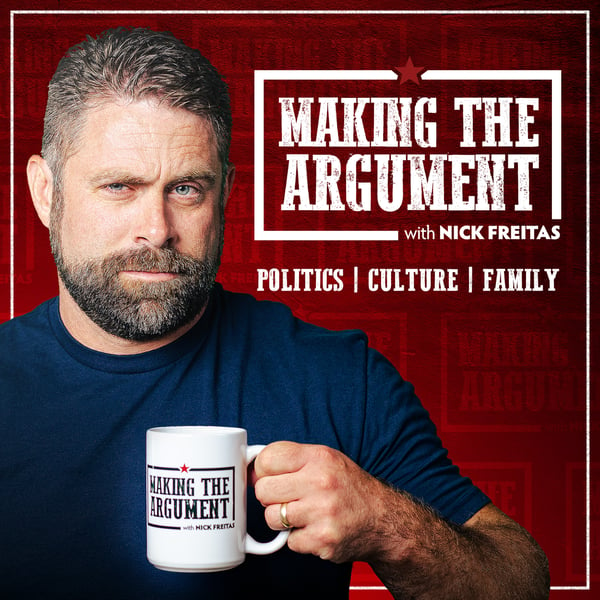The Four Principles of America First Foreign Policy
Making the Argument with Nick Freitas
Nick Freitas
4.4 • 743 Ratings
🗓️ 22 May 2025
⏱️ 69 minutes
🧾️ Download transcript
Summary
Neoconservatism is on its way out, but what is going to replace it? Here are the four key pillars that should form the basis of an America First foreign policy.
-----
⭐ SPONSOR: True Classic
Unlock the secret to looking effortlessly stylish with True Classic. Their perfectly balanced fit, feel, and price ensure guys look and feel their best. Say goodbye to awkward bunching and tight spots; True Classic offers snugness where you need it and relaxation where you want it. It's time to upgrade your wardrobe essentials with intentionality and comfort.
🔗 BUNDLE AND SAVE HERE: https://Trueclassic.com/nick
-----
🎁 GET YOUR MERCH HERE: https://shop.nickjfreitas.com/
🤝 BECOME A MEMBER OF THE IC: https://NickJFreitas.com
Instagram: www.instagram.com/nickjfreitas/
Facebook: https://www.facebook.com/NickFreitasVA
Twitter: https://twitter.com/NickJFreitas
Transcript
Click on a timestamp to play from that location
| 0:00.0 | Hello, everyone, and welcome back to making the argument. Today, we're going to have an important |
| 0:03.6 | discussion about the concept of foreign policy, specifically what does an American-first |
| 0:11.0 | foreign policy look like? There's been a lot of discussion about domestic policy, about taxes, |
| 0:16.2 | about regulations. You see all the work the Doge is doing. All of it been very good, very important. |
| 0:20.2 | You've seen it about with immigration, but when it comes to foreign policy, much of U.S. |
| 0:24.5 | foreign policy has been dictated by what we oftentimes call the post-World War II consensus. |
| 0:31.1 | And a lot of that was based around the idea of trying to prevent another world war, |
| 0:35.5 | trying to prevent nuclear war, trying to prevent the rise of communism, |
| 0:39.3 | totalitarianism, or authoritarianism in all of its various forms. |
| 0:43.3 | And that led to certain alliances, NATO, the Warsaw Pact. |
| 0:47.3 | And after the Warsaw Pact fell, entering and navigating through this new world with the United States as the world's lone global hegemon |
| 0:54.3 | with the rise of China and other issues. But that post-World War II consensus seems to have |
| 1:01.4 | dictated most of the United States' foreign policy objectives and operations for quite some time. |
| 1:08.0 | And now it appears to be, we'll just say, either being heavily |
| 1:12.5 | reformed or potentially even ended. And I recently read an article by a gentleman named David |
| 1:19.5 | Bragg. And he laid out what I thought was one of the most concise and comprehensive |
| 1:24.1 | arguments I've seen for trying to articulate a concrete example of what an |
| 1:31.0 | American first foreign policy should look like going forward. And that is what we're going to |
| 1:37.0 | analyze today. As always, I'm your host, Nick Freitas, and I'll read off some of my credentials |
| 1:42.0 | right here just so you understand that maybe I know a little bit about foreign policy, just a tad. |
| 1:45.8 | So not only have I worked in a state legislature, but before that, I also did 11 years active duty in the military to include a couple of combat tours with First Special Forces Group. |
| 1:53.7 | So I got a bit of a background in unconventional warfare, counterinsurgency, counterterrorism, things of that nature. And I'll be relying on some of that to kind of |
... |
Please login to see the full transcript.
Disclaimer: The podcast and artwork embedded on this page are from Nick Freitas, and are the property of its owner and not affiliated with or endorsed by Tapesearch.
Generated transcripts are the property of Nick Freitas and are distributed freely under the Fair Use doctrine. Transcripts generated by Tapesearch are not guaranteed to be accurate.
Copyright © Tapesearch 2025.

